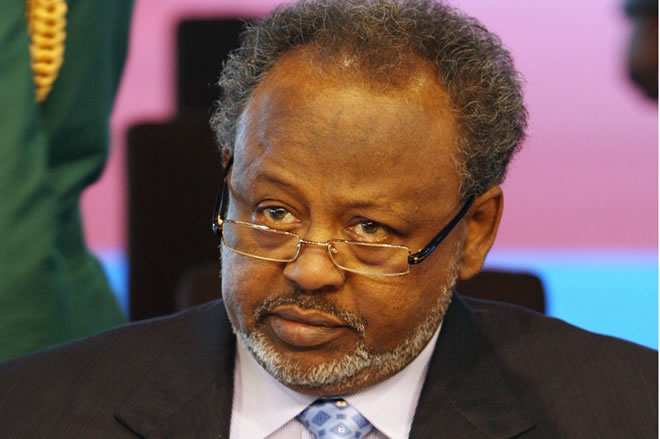by Ali Mohamed
Wednesday, July 15, 2015

President Geulleh had ruled Djibouti for 16 years
Djibouti, an impoverished, Muslim country in the Horn of Africa with less than a million inhabitants, recently “celebrated” its independence from France.
Many Djiboutians have nothing to celebrate in the face of the deprivation of political and civil liberties and press freedom.
The regime of President Ismail Omar Geulleh suppresses press freedom and internet access and cracks down on journalists. La Voix de Djibouti, an independent internet radio station run by Djiboutians in the diaspora, has been blocked and the website’s editor, Maydanah Abdallah Okeih, detained several times.
In 2011, Mr Geulleh, who had ruled Djibouti for 16 years, changed the constitution to allow him to run for a third term. He won by 80 per cent after the opposition boycotted the election. He is planning to run again in 2016.
The foreign aid and income that Djibouti receives from the leasing of foreign bases, has not improved the living conditions of its citizens. In 2014, the UN placed Djibouti at position 170 among the 187 countries surveyed in its human development index. Half of Djiboutians live in poverty and lack basic essentials such as water and healthcare.
President Obama has an opportunity, on his upcoming visit to the region, to address the human rights abuses and repression of the Djibouti regime.
Djibouti lies on the western shore of Bab-el-Mandeb, a strategic strait 18 miles wide joining the Gulf of Aden to the Red Sea. It serves as a regional port. Landlocked Ethiopia’s imports and exports go through this port.
Djibouti also hosts several foreign military bases, including the only American military base in Africa, Camp Lemonnier, a 500-acre, former French Foreign Legion post.
Camp Lemonnier, which hosts 4,000 personnel, is the hub of the US counter-terrorism efforts against Al-Shabaab in Somalia and Al-Qaeda in the Arabian Peninsula and elsewhere in Africa. The United States pays the Djibouti government $700 million to lease the site for 10 years.
We know that it is difficult for the Americans to take any action against Djibouti’s despotic regime because of these interests.
For 38 years, Djiboutians have suffered under one-party misrule and despotism. They deserve free and fair elections to choose their own leader and government without fear of repression. America, the European Union, and Africa have a duty to support human rights, democracy, and the rule of law everywhere in the world, including in Djibouti.
The consequences of not doing so are serious — political instability, uprising, and extremism. That would be dangerous for Bab-el-Mandeb, one of the world’ busiest maritime routes.
ALI MOHAMED is co-founder of the Horn of Africa Freedom Foundation, Lewis Center, Ohio.
This story originally appeared at Daily Nation